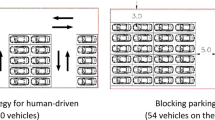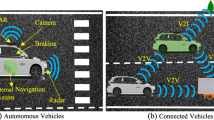Abstract
The situation of monotonous and high speed in highway will increase the risk of accidents. Drivers need to adjust the vehicle speed for safe-distance maintain. A device that can help drivers set a safe distance with the vehicle in front is known as adaptive cruise control (ACC). The ACC is a subsystem of advanced driver assistance systems (ADASs) that serves to assist the driver during cruise driving. This study presents the hardware simulation of camera-based ACC. Fuzzy logic is used to get smoother experimental car movements so that it is like a real vehicle. The results from hardware simulation show that camera-based ACC simulation and the fuzzy logic control can work according to the design. The results of ACC testing with a constant leading-vehicle speed have a success rate of 75%, while testing with a changing leading-vehicle speed has a success percentage of 60%.















Similar content being viewed by others
REFERENCES
Road safety: Commission welcomes agreement on new EU rules to help save lives, Brussels: European Commission, 2019.
Basjaruddin, N.C., Kuspriyanto, Saefudin, D., and Nugraha, I.K., Developing adaptive cruise control based on fuzzy logic using hardware simulation, Int. J. Electr. Comput. Eng., 2014, vol. 4, no. 6, pp. 944–951.
Basjaruddin, D.B., Margana, D.B., Kuspriyanto, Rinaldi, R., and Suhendar, Hardware simulation of advanced driver assistance systems based on fuzzy logic, Int. Rev. Mod. Simul., 2018, vol. 11, no. 1, pp. 24–31.
Basjaruddin, N.C., Kuspriyanto, Suhendar, Saefudin, D., and Azis, V.A., Hardware simulation of automatic braking system based on fuzzy logic control, J. Mechatronics, Electr. Power, Veh. Technol., 2016, vol. 7, no. 1, pp. 1–6. https://doi.org/10.14203/j.mev.2016.v7.1-6
Basjaruddin, N.C., Kuspriyanto, Saefudin, D., and Rachman, A., Hardware simulation of active lane keeping assist based on fuzzy logic, Indones. J. Electr. Eng. Comput. Sci., 2017, vol. 5, no. 2, pp. 321–326. doi https://doi.org/10.11591/ijeecs.v5.i2.pp321-326
Lussereau, J., Stein, P., David, J.-A., Rummelhard, L., Nègre, A., Laugier, C., Vignard, N., and Othmezouri, G., Integration of ADAS algorithm in a vehicle prototype, IEEE Int. Workshop on Advanced Robotics and Its Socila Impacts ARSO 2015, Lyon, 2015.
Khan, M.Q. and Lee, S., Gaze and eye tracking: Techniques and applications in ADAS, Sensors, 2019, vol. 19, no. 24, p. 5540. https://doi.org/10.3390/s19245540
Darms, M., Data fusion of environment-perception sensors for ADAS, Handbook of Driver Assistance Systems, Winner, H., Hakuli, S., Lotz, F., and Singer, C., Eds., Cham: Springer, 2016, pp. 549–566. https://doi.org/10.1007/978-3-319-12352-3_24
John, V. and Mita, S., Deep sensor fusion for ADAS applications, Smart Vehicle Research Center, 2018.
Goodin, C., Carruth, D., Doude, M., and Hudson, C., Predicting the influence of rain on LIDAR in ADAS, Electronics, 2019, vol. 8, no. 1, p. 89. https://doi.org/10.3390/electronics8010089
Reway, F., Huber, W., and Ribeiro, E.P., Test methodology for vision-based ADAS algorithms with an automotive camera-in-the-loop, IEEE Int. Conf. on Vehicular Electronics and Safety (ICVES), Madrid, 2018, IEEE, 2018, pp. 1–7. https://doi.org/10.1109/ICVES.2018.8519598
Son, T.D., Hubrechts, J., Awatsu, L., Bhave, A., and Van der Auweraer, H., A simulation-based testing and validation framework for ADAS development, Proc. of 7th Transport Research Arena TRA 2018, Vienna, 2018.
Flores, C. and Milanés, V., Fractional-order-based ACC/CACC algorithm for improving string stability, Transp. Res. C: Emerging Technol., 2018, vol. 95, pp. 381–393. https://doi.org/10.1016/j.trc.2018.07.026
Zhenhaia, G., Juna, W., Hongyua, H., Weia, Y., Dazhi, W., and Lin, W., Multi-argument control mode switching strategy for adaptive cruise control system, Procedia Eng., 2016, vol. 137, pp. 581–589. https://doi.org/10.1016/j.proeng.2016.01.295
Park, S.-K., Kim, B.-Y., Jeong, S.-H., Kang, H.-J., and Yoon, P.-J., Lane estimation using lateral histogram in radar based ACC system, 11th European Radar Conf., Rome, 2014, IEEE, 2014, pp. 193–196. https://doi.org/10.1109/EuRAD.2014.6991240
Seyffarth, T., Design and analysis of an image-based ACC controller, 50th IEEE Conf. on Decision and Control and European Control Conf., Orlando, Fla., 2011, IEEE, 2011, pp. 8068–8075. https://doi.org/10.1109/CDC.2011.6160481
Li, F. and Wang, Y., Cooperative adaptive cruise control for string stable mixed traffic: Benchmark and human-centered design, IEEE Trans. Intell. Transp. Syst., 2017, vol. 18, no. 12, pp. 3473–3485. https://doi.org/10.1109/TITS.2017.2760805
Nowakowski, C., Shladover, S.E., Lu, X.-Y., Thompson, D., and Kailas, A., Cooperative Adaptive Cruise Control (CACC) for Truck Platooning: Operational Concept Alternatives, Berkeley, Calif.: Federal Highway Administration, 2015.
Funding
This paper has been funded by DRPM Grant 2019 (contract no. 135/SP2H/LT/DRPM/2019) from the Indonesian Ministry of Research, Technology and Higher Education.
Author information
Authors and Affiliations
Corresponding authors
Ethics declarations
The authors declare that they have no conflicts of interest.
About this article
Cite this article
Noor Cholis Basjaruddin, Saefudin, D. & Andriani, N. Hardware Simulation of Camera-Based Adaptive Cruise Control Using Fuzzy Logic Control. Aut. Control Comp. Sci. 55, 501–509 (2021). https://doi.org/10.3103/S0146411621060031
Received:
Revised:
Accepted:
Published:
Issue Date:
DOI: https://doi.org/10.3103/S0146411621060031




